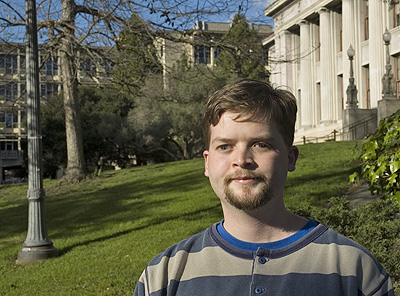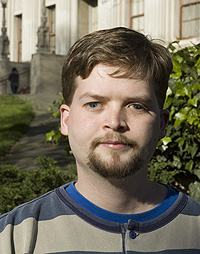UC Berkeley Web Feature
 |
Bruce Sexton, an interdisciplinary studies major who is suing Target to make its website accessible for blind users. (Bonnie Azab Powell photos) |
Transfer student Bruce Sexton has Target-ed independence for blind people as a major goal
BERKELEY – Bruce "B.J." Sexton seems like a quiet, mild-mannered guy. But he can speak up when he has to. "People think I'm radical because I'm suing Target," says the third-year UC Berkeley student, who is president of the California Association of Blind Students and legally blind. "They don't try to understand what this is about."
He explains that he agreed to be a plaintiff, along with the National Federation of the Blind (NFB) and its California chapter, in a class-action suit filed February 7 against the discount retail giant only as a last resort. Starting in May 2005, the NFB and a Berkeley nonprofit law firm, Disability Rights Advocates, had been in active discussions with Target Corporation about making its website work with the screen-reading technologies used by the visually impaired, as many other business websites do. (To learn what's at issue with Target.com, see sidebar below.) When the talks broke down, the firm filed suit on behalf of the NRB and that of all blind people in California.
Websites are not just for the sighted The lawsuit that Disability Rights Advocates (DRA) filed against Target on behalf of Sexton and others, alleges that Target's website, Target.com, is inaccessible to blind people using screen readers and other assistive technology. It thus "excludes the blind from full and equal participation in the growing Internet economy that is increasingly a fundamental part of daily life," the complaint says. Target.com:
The lawsuit alleges that these barriers violate the California Unruh Civil Rights Act, "which applies to any business establishment of any kind whatsoever and prohibits discrimination on the basis of race, disability, et cetera. It's broader than the Americans with Disabilities Act, which only covers places of public accommodation," according to Mazen Basrawi, one of the DRA attorneys who filed the suit. (Basrawi, a Boalt Hall Law School '04 alumnus, is also blind.) "The bottom line is that it's in Target's interest to make its website accessible. We're asking them to make more money." Asked for comment, a Target spokesperson replied via e-mail that "we strive to make our goods and services available to all of our guests, including those with disabilities." Target's website says it is "powered by" technology provided by partner Amazon.com. That Internet giant's website also lacks alt-text and uses image maps — the same barriers as Target's. However, Amazon.com does not have a physical retail presence, and the courts have not yet determined whether disability rights laws apply to the Internet. Could a successful suit against Target provide the first building block in case law for this new frontier? Is Target just the first target? Basrawi is noncommittal. "Establishing a precedent that would require a bricks-and-mortar store to make its website accessible might certainly be a step toward asking an Internet-only store to do so, too," he acknowledges. "I definitely think companies are watching this case closely." |
"I am not 'lawsuit happy.' We're doing this to make a point," emphasizes Sexton. "As a blind person, you can't be shy about asking people for help. It's hard to ask, especially for accommodations. But if Target complies, it will make [blind people] more independent, and the company will probably end up making more money."
Sexton's own independence has been hard won and remains an ongoing battle, of which the Target suit represents merely one front. "I've been learning to be an activist — starting with my own education," he says.
Braille road
Sexton, 24, grew up in Dublin, Calif., the fifth of seven children. His mother and one of his older sisters are also blind. He began going to NFB conventions when he was 12. "It was an amazing experience to be around thousands of blind people," he recalls. "I'd always heard 'you can do whatever you want,' but to meet all these doctors and lawyers was really inspiring."
After two years at Las Positas College in Livermore, in fall 2005 he transferred to UC Berkeley, where he is majoring in interdisciplinary studies. Sexton says the flexible major will help him figure out how to open a center for blind and visually impaired people in Berkeley after he graduates. There, all students will learn Braille and how to navigate with a cane in addition to practicing basic independence skills such as cooking, cleaning, and ironing, and confidence-building activities such as woodworking. Those who still possess some vision will have to wear "sleep shades," or blindfolds, the entire time — which is a pretty radical departure from existing California schools for the blind, Sexton says. "If you train under sleep shades, you'll have the skills of a blind person," he explains.
He knows firsthand how critical such skills can be. "I'm betwixt and between the sighted and blind world, as I've always been able to see some," says Sexton. His vision is just enough to see general shapes and to distinguish between light and dark. "But I'd rather call myself blind in a sighted world, because visually impaired people are often forced to see when they can't."
That's what happened to the young B.J. Both his mother and sister learned Braille at an early age, but Sexton did not learn the tactile language until he was 18. His Individualized Education Plan (IEP) team members had determined early on that he should learn to read using print instead.
It was a painful, frustrating process. Sexton recalls having to use magnifiers and hold large-type books an inch away from his face — so close that he had to move his head, instead of his eyes, from word to word. He could not scan the letters fast enough to be able to read out loud with his classmates. After high school, he attended the Louisiana Center for the Blind's nine-month program to help prepare him for college and living alone. There, he learned Braille and became used to getting around using a cane. The Louisiana Center's classes and philosophy are the inspiration for the center Sexton wants to open.
Sighted readers may be surprised to hear that Sexton's early educational experience was the norm until relatively recently. Legal blindness does not necessarily mean total blindness; 90 percent of people who are legally blind have some remaining vision. In the 1995-1996 school year, according to the NFB, there were around 54,000 legally blind children enrolled in U.S. schools, of whom fewer than 5,000 read Braille. "Braille has become not the method of choice but the method of last resort," wrote the organization in a fact sheet about its attempts to get Congress to amend the federal Individuals with Disabilities Education Act (IDEA). It successfully did so in 1997. From that day forward, Braille is the starting point: all visually impaired children are supposed to be taught Braille unless all of the child's IEP team members agree it is unnecessary.
Technological vs. human assistance
Now, Sexton carries an electronic Braille keyboard to class with him; he can download the notes from it to his computer, then use software that reads them aloud. He says that his Braille reading is still rather slow, and that he wishes he had learned it much younger. Because the latest versions of college textbooks are mostly not available in Braille, he learned as part of the Louisiana Center for the Blind's college-preparation classes to use a combination of technology and human assistance to study. A software program called JAWS, for Job Access With Speech, converts text to speech from scanned-in textbooks and other printed materials, and audio recordings are available for some course materials.
 'I'm betwixt and between the sighted and blind world, as I've always been able to see some. But I'd rather call myself blind in a sighted world, as visually impaired people are often forced to see when they can't.' -Bruce Sexton |
But the easiest and most efficient way for Sexton to study, he says, is to have access to human help, as the technological solutions just are not up to par. "It's hard to skim with JAWS, because the page numbers are scattered all over the place. And a scanner can't do anything with graphs or pictures, whereas I can ask a reader to describe the pictures to me or summarize the graphs and charts," he explains. He can ask a human reader to look at his classroom syllabus and find the appropriate chapter to read in a fraction of the time it takes to scan the syllabus, find the correct section using JAWS, then locate the appropriate chapter in the textbook. "And with a reader, I can ask them to repeat something, or spell out certain words, which I can't with a recording. Electronic text is a little better, but take a Shakespeare play, for example: the text is on one side and the definitions of unfamiliar words are on the other. I can't just look across to see the word I don't know, which a [human] reader could."
At Las Positas Community College, Sexton received several hours of reading assistance per week, and made mostly A's and B's during his two years there. He was dismayed when shortly after he came to Berkeley, he learned that due to state budget cuts, the funding for auxiliary services provided by the Disabled Students' Program — which covers assistance outside the classroom — had been slashed. While according to DSP Director Ed Rogers the funding was almost immediately restored through a special three-year, $25,000 annual grant from the chancellor's office, disabled students now must apply for such services, which are granted on an individual basis.
Last semester, Sexton received four incompletes. He says he has been discouraged from asking for readers, except on those occasions when a certain assignment — like the Shakespeare play — makes it really necessary. "But how do I know which books will need it?" he says in frustration. "I feel like I'm having to learn how to read again, using a new technology."
Rogers maintains that on the whole, the DSP's services far exceed what other universities offer. "Berkeley has gone above and beyond what's mandated by law," he says. The law requires the university to provide "equally appropriate accommodation," not whichever specific accommodation each individual student may want.
Sexton says that he has been told that "having readers is outdated and 'Hey, blind guys just take longer to do things.' No. Give me the resources I need and I'll be out of here in two years."
Not that he is in a hurry to leave Berkeley. "I love learning here. I love the professors and the atmosphere. I love everything about being a student," he insists. "But I wish I were getting the materials and the help I need to be able to do my work effectively."

